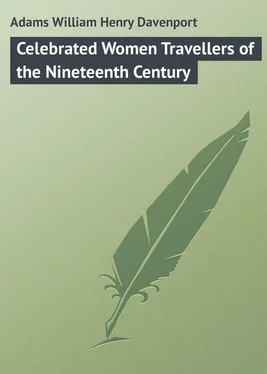William Adams - Celebrated Women Travellers of the Nineteenth Century
Здесь есть возможность читать онлайн «William Adams - Celebrated Women Travellers of the Nineteenth Century» — ознакомительный отрывок электронной книги совершенно бесплатно, а после прочтения отрывка купить полную версию. В некоторых случаях можно слушать аудио, скачать через торрент в формате fb2 и присутствует краткое содержание. Жанр: foreign_prose, foreign_language, на английском языке. Описание произведения, (предисловие) а так же отзывы посетителей доступны на портале библиотеки ЛибКат.
- Название:Celebrated Women Travellers of the Nineteenth Century
- Автор:
- Жанр:
- Год:неизвестен
- ISBN:нет данных
- Рейтинг книги:4 / 5. Голосов: 1
-
Избранное:Добавить в избранное
- Отзывы:
-
Ваша оценка:
- 80
- 1
- 2
- 3
- 4
- 5
Celebrated Women Travellers of the Nineteenth Century: краткое содержание, описание и аннотация
Предлагаем к чтению аннотацию, описание, краткое содержание или предисловие (зависит от того, что написал сам автор книги «Celebrated Women Travellers of the Nineteenth Century»). Если вы не нашли необходимую информацию о книге — напишите в комментариях, мы постараемся отыскать её.
Celebrated Women Travellers of the Nineteenth Century — читать онлайн ознакомительный отрывок
Ниже представлен текст книги, разбитый по страницам. Система сохранения места последней прочитанной страницы, позволяет с удобством читать онлайн бесплатно книгу «Celebrated Women Travellers of the Nineteenth Century», без необходимости каждый раз заново искать на чём Вы остановились. Поставьте закладку, и сможете в любой момент перейти на страницу, на которой закончили чтение.
Интервал:
Закладка:
All this part of the coast is barren and bleak; a barrier of rock seems to shut out the stranger from the celebrated peninsula which warlike nations have ravaged and commercial nations coveted. Richly gifted by Nature's liberal hand, it has always been an object of desire to the people of Europe and Asia. Pastoral races have lusted after its green mountain ranges; commercial nations have striven to gain possession of its ports and straits; warrior tribes have pitched their tents in its fertile valleys; and all have craved a foothold in that land to which cling so many glorious memories of the Greek civilization. But in the eighteenth century the contention came to an end, at least so far as political observers can determine, for ages, and under the rule of the Russian Czar, the Crimea has long enjoyed a profound tranquillity. 6 6 Except when broken by the war of 1855.
"So that," as Mr. Kinglake puts it, "the peninsula which divides the Euxine from the Sea of Azov was an almost forgotten land, lying out of the chief paths of merchants and travellers, and far away from all the capital cities of Christendom. Rarely went thither any one from Paris, or Vienna, or Berlin; to reach it from London was a harder task than to cross the Atlantic; and a man of office receiving in this distant province his orders despatched from St. Petersburg, was the servant of masters who governed him from a distance of a thousand miles.
"Along the course of the little rivers which seamed the ground, there were villages and narrow belts of tilled land, with gardens and fruitful vineyards; but for the most part this neglected Crim-Tartary was a wilderness of steppe or of mountain-range, much clothed towards the west with tall stiff grasses, and the stems of a fragrant herb like southernwood. The bulk of the people were of Tartar descent, but no longer what they had been in the days when nations trembled at the coming of the Golden Horde; and although they yet hold to the Moslem faith, their religion has lost its warlike fire. Blessed with a dispensation from military service, and far away from the accustomed battle-fields of Europe and Asia, they lived in quiet, knowing little of war except what tradition could faintly carry down from old times in low monotonous chants. In their husbandry they were more governed by the habits of their ancestors than by the nature of the land which had once fed the people of Athens, for they neglected tillage and clung to pastoral life. Watching flocks and herds, they used to remain on the knolls very still for long hours together, and when they moved, they strode over the hills in their slow-flowing robes with something of the forlorn majesty of peasants descended from warriors." 7 7 A. W. Kinglake: "Invasion of the Crimea," Vol. i., c. 1, 6th edition.
Into this secluded and remote peninsula Madame de Hell and her husband carried their rare powers of observation and description. They landed at Balaklava, since so famous in the annals of the British army, for it was there that "the thin red line" resisted unmoved all the fury and force of the Muscovite hosts. Its appearance from the sea is very attractive, for its port is surrounded with mountains, the highest of which still retains a memorial of the old Genoese dominion, while in part of its blue expanse lies the pretty Greek town, with its balconied houses and masses of foliage rising in terraces one above the other. Above it towers a ruined castle, whence the Genoese, in their days of supremacy, scanned with vulture-gaze the sweep of sea, prepared to pounce upon any hapless vessel wind-driven into these waters. It was Sunday when our travellers arrived, and the whole population were holiday making on the green shore or greener heights. Groups of mariners, Arnaouts in their quaint costume, and girls as graceful of shape as those who of old joined in the choric dances of Cytherea, wound their way up the steep path to the fortress, or tripped in mirthful measures to the shrill music of a balalaika.
The day after their arrival at Balaklava they undertook a boating excursion to explore the geological formation of the coast, and landed in a delightful little cove, embowered amid flowering trees and shrubs. On their return the boatmen decked themselves and their boat with wreaths of hawthorn and blossoming apple sprays, so that they entered the harbour with much festal pomp. In her poetic enthusiasm, Madame de Hell, as she gazed upon the cloudless sky and the calm blue sea and the Greek mariners, who thus, on a foreign shore, and after the lapse of so many centuries, retained the graceful customs of their ancestors, could not but be reminded of the deputations that were wont every year to enter the Piræus, the prows of their vessels bright with festoons of flowers, to share in the gorgeous festivals of Athens.
From Balaklava the travellers proceeded to Sevastopol, of which Madame de Hell supplies an excellent description, necessarily rendered valueless, however, by the events of the Crimean war. She speaks of its harbour as one of the most remarkable in Europe. It owes all its excellence to Nature, which has here, without assistance from the science of the engineer, provided a magnificent roadstead, the branches of which form a number of basins admirably adapted for the requirements of a great naval station. The whole expanse of this noble harbour is commanded from the upper part of the town. The roadstead first catches the eye; it stretches east and west, penetrates inland to a depth of four miles and three-quarters, with a mean breadth of 1,000 yards; and forms the channel of communication between Sevastopol and the interior of the peninsula. The northern shore is girt by a line of cliffs; the southern shore, broken up by numerous natural basins. To the east, at the very foot of the hill on which the town stands, lies South Bay, nearly two miles in length, and completely sheltered by high limestone cliffs. Beyond lies the dockyard, and the dock, which is of great extent; and to the west may be seen Artillery Bay.
In spite of the historical interest which now attaches to Sevastopol, as the scene of the crowning struggle between Russia and the Western Powers, the most remarkable place in the Chersonese is Bagtche Serai, "that ancient city which, prior to the Muscovite conquest of the peninsula, might compete in wealth and power with the great cities of the East." Beautiful exceedingly is the approach to it, by a road running parallel with a chain of heights, and clothed with luxuriant orchards, studded with village and farm, and brightened by the sheen of brooks. Owing to an ukase of Catherine II., which allowed the Tartars to keep possession of their ancient capital, Bagtche Serai retains to this day its individuality of aspect. It is neither modernized nor Russianized. Sauntering through its narrow streets, and looking upon its mosques, shops, and cemeteries, the traveller feels that the atmosphere of the East is around him. And amid the courts and gardens of the old palace he may well believe himself transported to an "interior" in Bagdad or Aleppo.
This palace has been celebrated by the muse of Pushkin, the Russian poet; in fine, it is not possible to do justice to its charms, which seem to have powerfully impressed our traveller's susceptible imagination. "It is no easy task," she exclaims, "to describe the magic of this superb and mysterious abode, wherein the voluptuous Khans forgot the trials and sorrows of life: I cannot do it, as in the case of one of our Western palaces, by analyzing the style, the arrangement, and the details of its splendid architecture, by deciphering the idea of the artist in the regularity, grace, and simplicity of the noble edifice. All this may easily be understood or described, but one needs something of the poet's heart and brain to appreciate an Oriental palace, the attraction of which lies not in what one sees, but in what one feels (and imagines?). I have heard persons speak very contemptuously of Bagtche Serai. 'How' they ask, 'can any one apply the name of palace to that cluster of wooden houses, daubed with coarse paintings, and furnished only with divans and carpets?' From this point of view they are right. The positive cast of their minds prevents them from seeing the beautiful in aught but costly material, well-defined forms, and highly-polished workmanship: hence, to them Bagtche Serai must be a mere group of shabby huts adorned with paltry ornaments, and fit only for the habitation of miserable Tartars."
Читать дальшеИнтервал:
Закладка:
Похожие книги на «Celebrated Women Travellers of the Nineteenth Century»
Представляем Вашему вниманию похожие книги на «Celebrated Women Travellers of the Nineteenth Century» списком для выбора. Мы отобрали схожую по названию и смыслу литературу в надежде предоставить читателям больше вариантов отыскать новые, интересные, ещё непрочитанные произведения.
Обсуждение, отзывы о книге «Celebrated Women Travellers of the Nineteenth Century» и просто собственные мнения читателей. Оставьте ваши комментарии, напишите, что Вы думаете о произведении, его смысле или главных героях. Укажите что конкретно понравилось, а что нет, и почему Вы так считаете.












